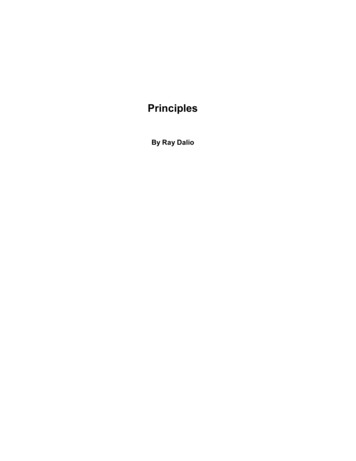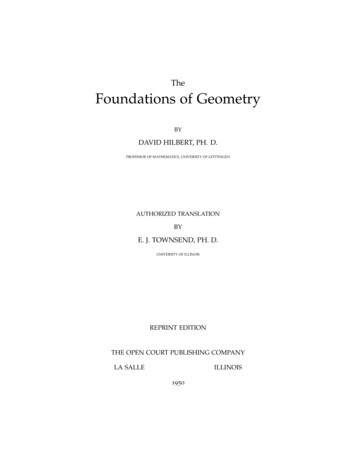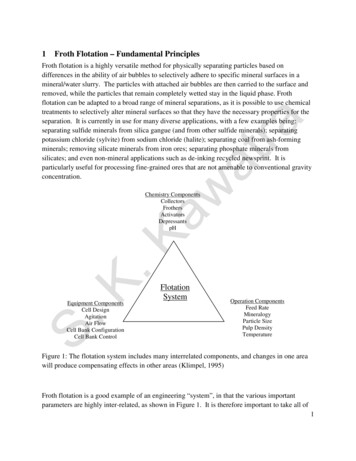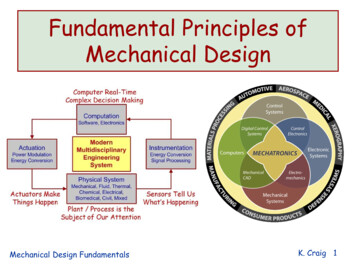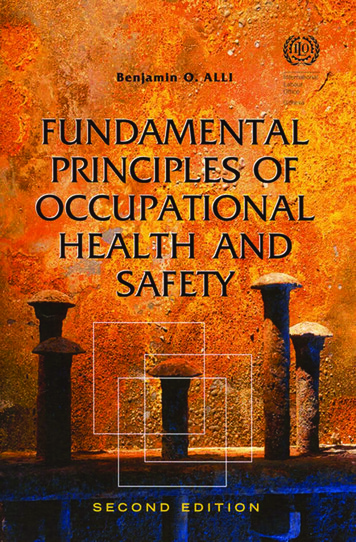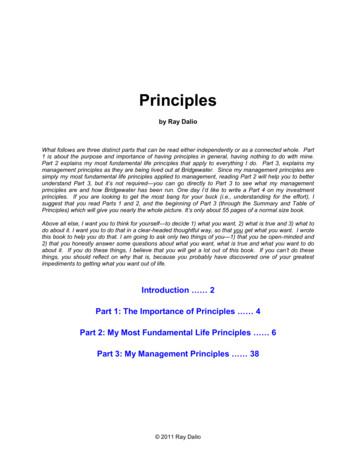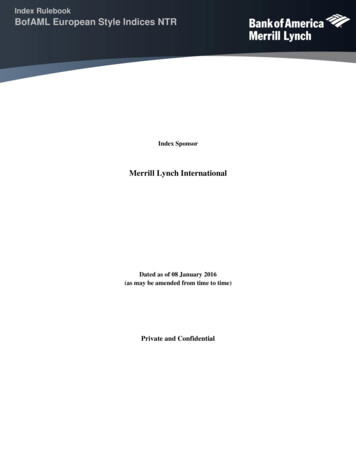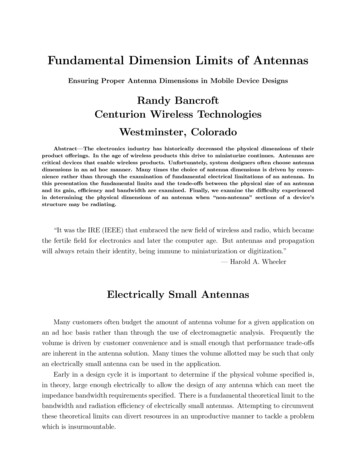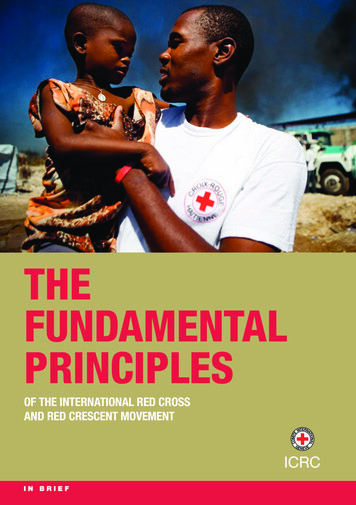
Transcription
THEFUNDAMENTALPRINCIPLESOF THE INTERNATIONAL RED CROSSAND RED CRESCENT MOVEMENT
Christoph von Toggenburg/ICRCTHE FUNDAMENTAL PRINCIPLES OF THE INTERNATIONALRED CROSS AND RED CRESCENT MOVEMENTHumanity, impartiality, neutrality, independence,voluntary service, unity and universality: theseseven Fundamental Principles sum up theMovement’s ethics and are at the core of itsapproach to helping people in need during armedconflict, natural disasters and other emergencies.These principles unite the components of theMovement – the ICRC, the National Societiesand the International Federation – and enablethem to provide effective, unbiased assistanceto people in need. They are mandatory rules ofconduct that the Movement’s components arerequired to follow at all times, and States mustrespect this necessity.The Fundamental Principles are key to theMovement’s identity. Adherence to theseprinciples ensures the humanitarian nature of theMovement’s work and brings consistency to thebroad range of activities it undertakes around theworld. The principles provide a common bondfor the National Societies, which vary greatly instructure, culture and membership.
Y SERVICEKate Holt/ICRCChristophe von Toggenburg/ICRCTHE FUNDAMENTALPRINCIPLESHUMANITYThe International Red Cross and Red CrescentMovement, born of a desire to bring assistancewithout discrimination to the wounded on thebattlefield, endeavours – in its internationaland national capacities – to prevent andalleviate suffering wherever it may be found.Its purpose is to protect life and health andto ensure respect for every human being. Itpromotes mutual understanding, friendship,cooperation and lasting peace amongstall peoples.UNITYUNIVERSALITYThis principle, which underpins all the otherprinciples, encompasses several ideas: Suffering is universal and requiresa response: it cannot be met withindifference. Respect for human dignity is paramount ineverything the Movement does. It implieshelping and protecting others regardlessof who they are or what they have done. The Movement protects life and healthby promoting international humanitarianlaw, preventing disaster and disease, andundertaking life-saving activities, from firstaid to the provision of food and shelter.
Christian Cardon de Lichtbuer/ICRCIMPARTIALITYNEUTRALITYThe Movement makes no discrimination asto nationality, race, religious beliefs, class orpolitical opinions. It endeavours to relieve thesuffering of individuals, being guided solelyby their needs, and to give priority to the mosturgent cases of distress.In order to continue to enjoy the confidenceof all, the Movement may not take sidesin hostilities or engage at any time incontroversies of a political, racial, religiousor ideological nature.The principle of impartiality embodies threerelated concepts: Non-discrimination: Members of theMovement help people regardless oftheir religious beliefs, the colour of theirskin, their political convictions, wherethey come from, or whether they are richor poor. Proportionality: Whether treating thewounded or distributing food, members ofthe Movement must ensure that those ingreatest need receive assistance first. Impartiality: Decisions must be madeon a “needs only” basis and must not beinfluenced by personal considerationsor feelings.The Movement must not take sides or beregarded as doing so, either in its speech or in itsactions, at any time or in any place. This enablesits components to reach people who need helpin crises and to maintain a dialogue with thoseinvolved in armed conflict and other violence.The Movement’s neutrality helps assure parties toa conflict that assisting civilians and wounded ordetained fighters does not constitute interferencein the conflict. The Movement’s componentsmust build a reputation for neutral conduct inpeacetime, so that they have the confidenceof all sides, and can act more effectively at theonset of armed conflict or during other situationsof violence.
Ibrahim Malla/SARCINDEPENDENCEVOLUNTARY SERVICEThe Movement is independent. The NationalSocieties, while auxiliaries in the humanitarianservices of their governments and subject tothe laws of their respective countries, mustalways maintain their autonomy so that theymay be able at all times to act in accordancewith the principles of the Movement.The Movement is a voluntary relief movementnot prompted in any manner by desirefor gain. It is only by being truly independent thatthe Movement can respect the principlesof neutrality and impartiality. Although auxiliary to the publicauthorities in the humanitarian field,National Societies must retain theirautonomy when making decisions so thatthey can work in accordance with theFundamental Principles at all times and inall situations. This may mean turning downany requests that are in conflict with theseprinciples, and taking care not to submitto any interference or pressure. The Movement’s components shouldbe permitted to conduct independentassessments and to talk freely with peoplein need of assistance. The principle of voluntary service signifiesthe humanitarian motivation of all thepeople who work within the Movement,whether or not they are paid for it. Members of the Movement have nomotive for offering assistance other than adesire to help: this is a powerful statementof solidarity. The Movement’s extensive network ofRed Cross and Red Crescent volunteersis unique and ensures that peoplethroughout the world receive assistance.It is a source of initiative and of inspirationfor many other humanitarian endeavours;at the same time, it provides invaluableinformation about local contexts and themost appropriate way to help peoplein need. Through its volunteers, the NationalSocieties are rooted in local communitiesand help to strengthen and empowerthem.
Rama Humeid/ICRCBoris Heger/ICRCUNITYUNIVERSALITYThere can be only one Red Cross or one RedCrescent Society in any one country. It must beopen to all. It must carry on its humanitarianwork throughout its territory.The Movement, in which all NationalSocieties have equal status and share equalresponsibilities and duties in helping eachother, is worldwide.This principle enables National Societies to serveas a unifying force in countries and communities,and to promote understanding and peace. The universality of suffering requires auniversal response: National Societies existin almost every country in the world andthey have a collective responsibility toassist one another in responding to crisesand to support each other's developmentin a spirit of solidarity and mutual respect. Regardless of size or resources, eachNational Society has equal voting rights inthe Movement’s governing bodies. The principle of universality also meansthat the failings or omissions of onecomponent affect the entire Movement.The integrity and public image of theMovement depend on adherence by all tothe Fundamental Principles. The National Society must be the onlyone in the country and must conduct itshumanitarian activities throughout theterritory – in urban centres as well as inremote rural areas. It must recruit volunteers and staff, andmembers of its governing board, fromall ethnic and social groups withoutdiscriminating on the basis of race, gender,class, religion, political opinion or anyother criterion.
ICRCTHE INTERNATIONAL RED CROSSAND RED CRESCENT MOVEMENTThe International Red Cross and Red CrescentMovement is the largest humanitarian networkin the world. Its mission is to alleviate humansuffering, protect life and health, and upholdhuman dignity, especially during armed conflictsand other emergencies. It is present in everycountry and supported by millions of volunteers.It is not a single organization. It is composed ofthe International Committee of the Red Cross(ICRC), the International Federation of Red Crossand Red Crescent Societies and the 189 individualNational Red Cross and Red Crescent Societies.Each has its own legal identity and role, but theyare all united by seven Fundamental Principles.The ICRC’s exclusively humanitarian mission is toprotect the lives and dignity of victims of armedconflict and other situations of violence andto provide them with assistance. It directs andcoordinates the Movement’s international reliefactivities during armed conflicts. Established in1863, it is at the origin of the Movement.The International Federation inspires, facilitatesand promotes all humanitarian activitiescarried out by its member National Societiesin behalf of those who are most vulnerable. Itdirects and coordinates its members’ actions toassist the victims of natural and technologicaldisasters, refugees and those affected by healthemergencies. It was founded in 1919.National Societies act as auxiliaries to theirnational authorities in the humanitarianfield. They provide a broad range of servicesincluding disaster relief, and health and socialprogrammes. In wartime they may assist thecivilian population and support the medicalservices of the armed forces.
Front cover: Talia Frankel/American Red Cross4046/002 08.2015 5000International Committee of the Red Cross19, avenue de la Paix1202 Geneva, SwitzerlandT 41 22 734 6001 F 41 22 733 2057Email: shop@icrc.org www.icrc.org ICRC, August 2015
THE INTERNATIONAL RED CROSS AND RED CRESCENT MOVEMENT The International Red Cross and Red Crescent Movement is the largest humanitarian network in the world. Its mission is to alleviate human suffering, protect life and health, and uphold human dignity, especially during arme
